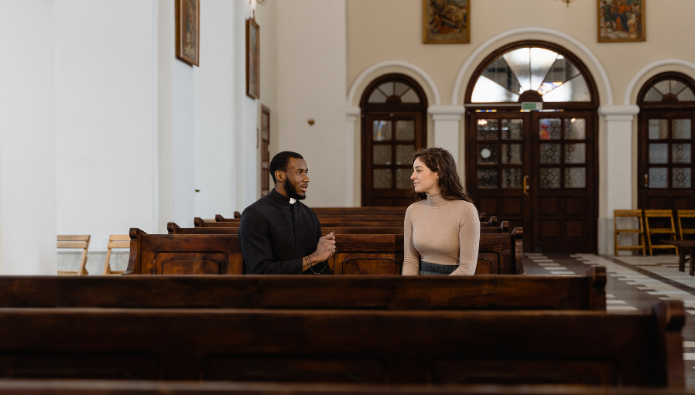Embarking on a spiritual journey often brings a mix of emotions and questions. As a new believer, you might find yourself navigating through a sea of doubts and uncertainties. It’s not uncommon to wonder if experiencing these doubts makes you less faithful or if you’re alone in this struggle. If you find yourself in this boat, rest assured, you are in good company. Doubt, in the context of faith, is not only natural but can also be a catalyst for deeper understanding and growth.
The path of faith is rarely a straight line; it is a journey with its own set of twists and turns. Having doubts does not mean you are veering off this path. Instead, it signifies that you are actively engaging with your beliefs, seeking to understand and internalize them more profoundly. This process is a vital part of spiritual growth.
In this exploration, we will delve into the nature of spiritual doubt, addressing common questions that might arise in your heart and mind. We’ll explore how to navigate these doubts constructively and how they can, surprisingly, strengthen your faith. This journey is not about finding all the answers but learning how to live with the questions and finding peace and strength in the process.
Whether you are wrestling with questions about God, grappling with scriptural interpretations, or struggling with personal challenges to your faith, this discussion aims to guide you through these waters. It’s a journey towards understanding that doubt is not the opposite of faith; rather, it is an integral part of the faith experience.
Read also: Understanding God’s Love
Understanding the Nature of Doubt

As you step forward on your spiritual journey, encountering doubts and questions can be a common experience. Understanding the nature of these doubts is crucial in navigating your path of faith. Doubt, in the spiritual context, isn’t a detour or dead-end; rather, it’s an integral part of the journey, a signpost that guides you to deeper understanding and more robust faith.
One of the most relatable examples of doubt in the Bible is that of Thomas, one of Jesus’ disciples. After Jesus’ resurrection, Thomas found it hard to believe that Jesus had risen from the dead without seeing Him with his own eyes (John 20:24-29). This incident, often referred to as the story of ‘Doubting Thomas,’ offers a powerful insight into the nature of doubt in faith. Thomas’s doubt wasn’t a rejection of faith; instead, it was a desire for a tangible experience of the truth he was grappling with.
What is particularly beautiful about this story is how Jesus responds to Thomas’s doubts. Instead of rebuke or dismissal, Jesus invites Thomas to touch His wounds, to see and feel the reality of His resurrection. This encounter is a profound reminder that doubts and questions are not only acknowledged in faith but are met with compassion and understanding.
Thomas’s experience teaches us that doubt does not make us less of a believer. In fact, it can be the very thing that strengthens our faith. It encourages us to seek out, to question, and to desire a more profound experience of truth. It is through this process of seeking that our understanding deepens, and our relationship with God becomes more rooted in personal experience and conviction.
Reflection Question: Can you think of a time when you, like Thomas, needed more than just words to believe something? How did that experience shape your understanding or belief?
As we explore further, let’s keep in mind that doubt is a natural and necessary companion on the journey of faith, guiding us towards deeper truth and understanding.
Common Doubts Among New Believers

Embarking on a spiritual journey is an experience filled with learning, growth, and inevitably, some questions. As a new believer, you may encounter a range of doubts that are quite common and understandable. Addressing these doubts directly can help demystify them and guide you towards answers and reassurance.
1. Doubting God’s Existence or Presence: One of the most fundamental doubts can be about the very existence of God or feeling His presence in your life. In moments of silence or unanswered prayers, it’s natural to question His presence. The Psalmist expresses this sentiment in Psalm 22:1, “My God, my God, why have you forsaken me?” This raw expression of feeling abandoned or distant from God is a part of the faith experience and reflects a yearning for a tangible sense of God’s presence.
2. Understanding the Bible: For many new believers, the Bible can be a source of both inspiration and confusion. Questions about the interpretation of certain passages or how they apply to modern life are common. The Ethiopian eunuch’s encounter with Philip in Acts 8:30-31, where he admits he needs guidance to understand the scriptures, is an excellent example of seeking understanding in faith.
3. Reconciling Faith with Science or History: Another area of doubt can arise when trying to reconcile religious beliefs with scientific understanding or historical facts. This doubt does not imply a lack of faith but rather a quest to understand how different aspects of truth coexist.
4. Personal Worthiness: Many new believers struggle with feeling unworthy of God’s love and grace, especially when reflecting on their past actions or current struggles. Remember, Romans 5:8 assures us that God’s love and grace are not contingent on our perfection.
Reflection Question: Which of these common doubts have you experienced? How do they make you feel about your faith journey?
Action Item: Choose one doubt you have and seek out a resource this week – a book, a sermon, or a conversation with a church leader – that can help you explore this doubt more deeply.
Addressing these doubts is not a sign of weak faith; rather, it is a sign of an active, seeking faith. Embrace these questions as opportunities for deeper understanding and growth in your spiritual journey.
Seeking Answers and Understanding

In the face of doubts and questions, it’s important to know that seeking answers is not only acceptable but encouraged in your faith journey. This process of seeking is not about finding absolute answers to every question but about deepening your understanding and relationship with God.
1. Turning to Scripture for Guidance: One of the primary ways to seek answers is through Scripture. The Bible, while ancient, speaks to timeless human experiences and questions. In Acts 17:11, the Bereans were commended for their diligence in searching the Scriptures daily to understand the truth. Like them, you can find guidance and insight for your doubts through regular Bible study.
2. Prayer as a Means of Seeking Answers: Prayer is another powerful tool in seeking understanding. It’s not just about presenting requests to God, but also about seeking wisdom and clarity. James 1:5 encourages us to ask God for wisdom, promising that He gives generously to all without finding fault.
3. Seeking Wisdom from Others: Engaging in discussions with pastors, mentors, or more experienced believers can provide valuable insights. Proverbs 11:14 highlights the importance of seeking guidance: “Where there is no guidance, a people falls, but in an abundance of counselors there is safety.” Don’t hesitate to ask questions and seek counsel from those who have walked the path of faith longer than you have.
4. Embracing Community Discussions: Participating in Bible study groups or faith-based discussions can be a safe space to express doubts and hear different perspectives. These interactions can offer communal wisdom and shared experiences that help in understanding and resolving doubts.
Reflection Question: What resources or practices can you turn to when seeking answers to your spiritual questions?
Action Item: This week, take a step towards seeking answers – join a Bible study group, schedule a meeting with a church leader, or start a journal for your prayers and reflections.
Remember, seeking answers is a journey that leads to growth. It’s about embracing the questions and finding peace in the knowledge that some mysteries may remain, yet our faith can continue to flourish.
Strengthening Faith Through Doubt

Embracing and working through your doubts is not a detour in your spiritual journey; rather, it’s a path that can lead to a stronger and more resilient faith. The process of questioning and seeking understanding often deepens our connection with God and enriches our spiritual life.
1. Doubt as a Catalyst for Growth: Rather than being a sign of weak faith, doubt can be a catalyst for spiritual growth. It propels us to seek deeper understanding and can lead to a more mature, robust faith. In the Bible, we see this in the life of Job, who despite his severe trials and questions about his suffering, ultimately came to a deeper realization of God’s sovereignty and wisdom (Job 42:1-6).
2. Building a Personal, Authentic Faith: Working through doubts helps us move from a faith that may initially be based on teachings or beliefs we’ve received from others, to one that is deeply personal and genuinely our own. It encourages us to develop a faith that is not just inherited, but thoughtfully and personally affirmed.
3. Learning to Trust God in Uncertainty: Navigating through doubts teaches us to trust God even in the midst of uncertainty. This trust is not about having all the answers, but about resting in the assurance of God’s character and promises. Proverbs 3:5-6 invites us to trust in the Lord with all our heart and lean not on our own understanding.
4. Encouraging Empathy and Understanding Towards Others: As you journey through your own doubts, you develop empathy and understanding for others who face similar questions. This can make you a more compassionate and supportive member of your faith community.
Reflection Question: How can your current doubts and questions about faith lead to deeper understanding and a stronger relationship with God?
Action Item: Reflect on a major doubt you have overcome in the past. Write down how this experience has strengthened your faith and what it taught you about trusting God.
Remember, doubts are not the end of faith; they are a part of the journey that leads to a deeper and more meaningful relationship with God.
The Role of Community in Addressing Doubts

While personal reflection is vital in navigating doubts, the role of a faith community cannot be overstated. Being part of a community offers support, diverse perspectives, and collective wisdom, which can be invaluable in addressing your doubts and questions.
1. Finding Support and Encouragement: A faith community provides a support network of individuals who have likely experienced similar doubts and can offer encouragement. Galatians 6:2 encourages us to “bear one another’s burdens,” highlighting the importance of supporting each other in our faith journeys. Sharing your doubts with trusted members of your community can bring not only relief but also practical advice and encouragement.
2. Learning from the Experiences of Others: Hearing how others have navigated their doubts can provide insight and perspective that you may not have considered. It’s an opportunity to learn from the journeys of others – both their struggles and their breakthroughs. Proverbs 27:17, “As iron sharpens iron, so one person sharpens another,” speaks to this mutual growth.
3. Engaging in Group Study and Discussion: Participating in Bible studies or discussion groups within your community can be particularly helpful. These settings allow for collective exploration of Scriptures and theological concepts, offering a range of interpretations and understandings that can shed light on your doubts.
4. Receiving Guidance from Spiritual Leaders: Pastors, ministers, and other spiritual leaders are resources for wisdom and guidance. They can offer biblical insights, pray with you, and provide counsel based on their experience and training.
Reflection Question: How can your faith community help you in addressing your doubts? Is there a group, individual, or leader you can turn to?
Action Item: Reach out to someone in your faith community this week – whether it’s joining a study group, scheduling a conversation with a spiritual leader, or simply sharing your journey with a fellow believer.
Remember, your journey of faith, including your doubts and questions, is not meant to be walked alone. Your faith community is there to walk alongside you, offering support, wisdom, and encouragement every step of the way.
Embracing the Journey of Faith, Doubt, and Growth

The journey of faith is unique to each individual and is often marked by cycles of doubt and reaffirmation. It’s important to embrace this journey, including the doubts and questions, as an integral part of growing and maturing in your faith. Understanding that this journey is not about reaching a state of perfect belief, but about ongoing learning and growth, can bring peace and a sense of purpose to your spiritual walk.
1. Seeing Doubt as Part of the Faith Journey: Rather than viewing doubts as failures or setbacks, see them as opportunities for growth and deepening your understanding. In the journey of faith, moments of doubt can lead to greater clarity, stronger conviction, and a more profound sense of connection with God.
2. Continuing to Grow and Learn: Faith is not static; it is dynamic and evolving. Just as we continue to grow and learn in other areas of life, our spiritual understanding and relationship with God also grow and evolve over time. This growth is beautifully illustrated in Ephesians 4:15, which encourages us to “grow up in every way into Him who is the head, into Christ.”
3. Maintaining a Hopeful Perspective: In moments of doubt, it’s essential to maintain a hopeful perspective, trusting that these challenges will lead to greater spiritual insight and strength. Romans 5:3-5 reminds us that suffering produces perseverance, character, and hope – a hope that does not disappoint us.
4. Valuing the Process Over Perfection: Embrace the fact that your faith journey is about progress, not perfection. It’s about the steps you take each day to grow closer to God, even amidst uncertainties and questions.
Reflection Question: How can embracing your doubts and questions today lead to a stronger, more mature faith in the future?
Action Item: Write a letter to yourself from a future perspective, reflecting on how the doubts you currently experience have strengthened and deepened your faith.
Remember, every believer’s journey is sprinkled with moments of doubt and questioning. These moments are not signs of weakness but are milestones of growth and understanding on your spiritual path.
Finding Assurance in Times of Doubt

In navigating the waters of doubt and uncertainty, finding assurance is key to maintaining a strong and resilient faith. It’s important to know where to look for this assurance and how to remind yourself of the steadfast nature of God’s love and promises, even when your feelings or circumstances might suggest otherwise.
1. Holding onto God’s Promises: Scripture is filled with promises that can serve as anchors in times of doubt. Hebrews 10:23 urges us to “hold unswervingly to the hope we profess, for he who promised is faithful.” Reflect on the promises found in the Bible, such as God’s constant presence (Matthew 28:20), His unchanging nature (James 1:17), and His plan for your welfare (Jeremiah 29:11). These promises are not just words; they are commitments from God Himself.
2. Experiencing God’s Presence: Assurance can also come from experiencing God’s presence in your life. This might be through prayer, worship, nature, or the kindness of others. Recognize and cherish these moments as reminders of God’s nearness and love.
3. Remembering Past Experiences: Reflect on times in your past when you have felt God’s presence or seen His work in your life. These memories can serve as powerful reminders of God’s faithfulness and can offer comfort during times of doubt.
4. Seeking Community Support: Share your struggles with trusted members of your faith community. Their support, experiences, and wisdom can provide you with much-needed assurance and perspective. As Ecclesiastes 4:9-10 says, “Two are better than one… If either of them falls down, one can help the other up.”
Reflection Question: What are some of God’s promises or past experiences that you can hold onto for assurance during times of doubt?
Action Item: Create a ‘faith reminder’ – a journal, a collection of key scripture verses, or a list of personal experiences where you’ve felt God’s presence – that you can turn to for reassurance when doubts arise.
Finding assurance in your faith journey is about remembering and holding onto the truths of God’s word and His character. It’s about seeing the evidence of His work in your life and in the lives of those around you.
Engaging with Difficult Questions and Complex Topics

As you continue on your spiritual journey, you may encounter complex theological questions or difficult topics that challenge your understanding and faith. Engaging with these topics thoughtfully and deliberately can lead to a deeper and more nuanced understanding of your beliefs.
1. Addressing Theological Challenges: Questions about the nature of God, the interpretation of difficult Scripture passages, or understanding the role of suffering in the world can be daunting. Tackling these challenges requires patience and an openness to explore diverse perspectives. In Isaiah 55:8-9, God reminds us, “For my thoughts are not your thoughts, neither are your ways my ways,” encouraging us to acknowledge the vastness and mystery of God’s wisdom.
2. Exploring the Intersection of Faith and Contemporary Issues: Your faith journey will likely intersect with contemporary social, scientific, and moral issues. Engaging with these topics from a faith perspective can be enriching and illuminating. It’s important to approach them with a balance of faith principles and an understanding of current contexts and knowledge.
3. Seeking Knowledge and Understanding: Pursuing theological education, whether through formal study, reading, or attending lectures and seminars, can provide valuable insights and understanding. Proverbs 2:6 reminds us, “For the Lord gives wisdom; from his mouth come knowledge and understanding.”
4. Embracing the Mystery of Faith: Some aspects of faith and God’s nature may remain mysterious and beyond complete human comprehension. Embracing this mystery is a part of the faith experience, acknowledging that there is a divine wisdom and understanding beyond our own.
Reflection Question: Are there any theological questions or contemporary issues that you find particularly challenging? How can you approach these in a way that is open and seeking of understanding?
Action Item: Identify a complex topic or question you are currently grappling with. Plan to read a book, watch a lecture, or attend a discussion group to explore this topic further.
Engaging with the deeper and more challenging aspects of faith is not a diversion but an integral part of a maturing spiritual journey. It leads to a faith that is thoughtful, informed, and deeply rooted.
Conclusion
As we conclude our exploration of navigating doubts and questions on your spiritual journey, it’s important to remember that this journey is as unique as you are. Each step, each question, each moment of doubt, is a part of the tapestry of your personal faith journey. Embracing these as opportunities for growth and deeper understanding can transform your spiritual walk from a path of uncertainty to one of rich, dynamic faith.
Remember, experiencing doubt does not make you less of a believer; it makes you an active seeker of truth. This active engagement is what shapes a robust and resilient faith. As you continue to explore and question, know that you are not alone. You are part of a vast community of believers, past and present, who have walked this path and have found that their faith, though tested, has become stronger and more meaningful.
Hold on to the promises found in Scripture, the wisdom gained from your community, and the personal experiences of God’s faithfulness in your life. These will be your guiding lights as you navigate the waters of doubt and belief. As Proverbs 3:5-6 encourages us, “Trust in the Lord with all your heart and lean not on your own understanding; in all your ways submit to him, and he will make your paths straight.”
Final Reflection Question: What insights have you gained about your doubts and how they can strengthen your faith?
Action Item: Moving forward, make a commitment to yourself to embrace your doubts as part of your faith journey. Choose to see them as opportunities for growth and deeper connection with God.
As you journey forward, may you find peace in the knowledge that your doubts are not a shadow over your faith, but rather the steps upon which your faith stands and grows stronger. Your journey through doubt and faith is not just a path to understanding but a journey of becoming who you are meant to be in the embrace of God’s infinite love and wisdom.








